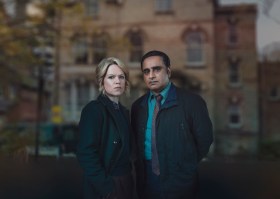Capturing the period of transition that accompanies every ascent to adulthood, the coming-of-age narrative explores a time of fading and focusing. All things child-like dwindle into the past, and the markers of getting older loom large, lingering over not only visions of the future, but the present. Bodily changes aside, typically the process remains emotional rather than physical, though not in The Boy and the Beast (Bakemono no ko).
As Ren (voiced by The Vancouver Asahi‘s Aoi Miyazaki as a child, and Strayer’s Chronicle‘s Shôta Sometani as a teenager) begins to take the necessary steps towards growing up, he leaves the world of humans for an adjacent realm populated by anthropomorphised animals.
Ren is the nine-year-oldboy of the feature’s title; his mismatched new mentor, Kumatetsu (Kôji Yakusho, A Samurai Chronicle), is the beast. Their paths intersect as the latter looks for an apprentice, with an heir a necessary component of his attempt to battle Iozen (Kazuhiro Yamaji, Return) to take over from Soshi (Masahiko Tsugawa, Meikyû Cafe) as the lord of the kingdom. Running away from home after his mother’s death and in the absence of his estranged father, the former is searching for somewhere to belong. Over the course of eight years, Ren finds such a place, takes the name Kyuta and learns the martial arts ways of his bear master, while Kumatetsu gains a protégé who helps temper the more impulsive side of his personality.
There’s little that isn’t obvious about the bulk of The Boy and the Beast‘s story, nor in the manner it approaches the act of embracing maturity; however the film doesn’t simply sweep its blossoming protagonist into an alternate domain, find parallels in his and Kumatetsu’s journeys, and use both as a method of rendering the real-life experience equally fantastical and accessible. Instead, writer/director Mamoru Hosoda steeps his feature in the uncertainty that exists between the extremes of youth and adulthood — and between animals and humans, lightness and darkness, brains and brawn, and different types of families, too — rather than speeding towards a seemingly inevitable outcome.
Indeed, like the filmmaker’s Wolf Children before it — with The Girl Who Leapt Through Time and Summer Wars also on his resume — the animated movie values the build up over resolution. Of course, given that its tale ostensibly combines elements of The Jungle Book and The Karate Kid, there’s no shortage of action, particularly in the third act. And yet, as a late film reference to Moby Dick reinforces, the feature remains as patient and contemplative as it does energetic in its training montages and combat sequences. Not only in presenting and dissecting the reasons Ren and Kumatetsu find a surrogate bond in each other but also helping them face their demons and move forward.
That blend of pondering and peppy shines through in everything from the vocal stylings of the Japanese-language cast to the brightly coloured, hand-drawn visuals, with both among The Boy and the Beast‘s highlights. Where the film struggles is in its length and impact, ultimately proving both prolonged and patchy. When the feature struggles, it can’t quite find the balance between the fading and focusing — not just of life stages, but of its subplots involving a human girlfriend for Ren and a haunting adversary, too — that it is trying to capture. Thankfully, when the rousing but not always riveting effort soars, it still treats audiences to an enchanting, enjoyable and earnest animated take on the coming-of-age genre.
Rating: 3 stars out of 5
The Boy and the Beast (Bakemono no ko)
Director: Mamoru HosodaJapan, 2015, 119 mins
Release date: March 3
Distributor: Madman
Rated: PG
Actors:
Director:
Format:
Country:
Release:





